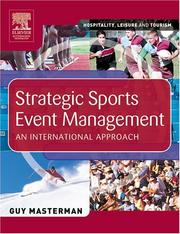Book
ISBN: 1473957966 1786842521 1473902436 9781473957961 9781786842527 9781473902435 Year: 2017 Publisher: Los Angeles : SAGE Reference,
Abstract | Keywords | Export | Availability | Bookmark
 Loading...
Loading...Choose an application
- Reference Manager
- EndNote
- RefWorks (Direct export to RefWorks)
The SAGE Handbook of Sport Management draws together the best current research on the major topics relevant to the field of sports management, including leadership, gender, diversity, development, policy, tourism, and media. Edited by two of the most respected figures in the field, the handbook includes contributions from leading sport management academics from Australia, Canada, New Zealand, USA, the UK and Europe. The key themes and debates of sport management are organized across three sections: sport management fundamentals and key concepts sport management challenges and issues sport management futures.
Book
ISBN: 1869229770 9781869229771 Year: 2023 Publisher: [S.l.] KR PUBLISHING
Abstract | Keywords | Export | Availability | Bookmark
 Loading...
Loading...Choose an application
- Reference Manager
- EndNote
- RefWorks (Direct export to RefWorks)

ISBN: 3486781863 3486200305 Year: 2004 Publisher: Münich, [Germany] : R. Oldenbourg Verlag,
Abstract | Keywords | Export | Availability | Bookmark
 Loading...
Loading...Choose an application
- Reference Manager
- EndNote
- RefWorks (Direct export to RefWorks)
Sport ist kein gewöhnliches Wirtschaftsgut. Die Traditionen der Sportbranche müssen ebenso berücksichtigt werden, wie die vielfältigen Differenzierungen in den über sechzig Sportarten auf verschiedenen Leistungsniveaus und die Zielvorstellungen der aktiv und passiv dem Sport Verbundenen. Wer aber nur seine Sportart kennt, ohne die wirtschaftlichen Zusammenhänge zu berücksichtigen, begeht zwangsläufig Fehler. Hier setzt dieses Buch ein, das den Charakter eines einführenden Lehrbuches hat. Die Autoren, behandeln insbesondere die Schnittstellen zwischen den Sport- und den Wirtschaftswissenschaften, die bei den meisten sport- oder wirtschaftswissenschaftlichen Darstellungen der Sportindustrie vernachlässigt werden. Es wendet sich an Studierende, die Verantwortung in der Sportindustrie übernehmen wollen, und an diejenigen, die sich im Sportmanagement weiterbilden wollen.
Book
ISBN: 1784029769 1473914590 9781784029760 9781473914599 Year: 2012 Publisher: Los Angeles, [Calif.] ; London : SAGE,
Abstract | Keywords | Export | Availability | Bookmark
 Loading...
Loading...Choose an application
- Reference Manager
- EndNote
- RefWorks (Direct export to RefWorks)
Sharp, clear and relevant this book meets the needs of those studying and researching within the growing discipline of sport management. The intelligently cross-referenced entries provide a concise overview of the key concepts in the field guiding you through the important debates, sources and research methods in the management of sport.
Periodical
ISSN: 22416323 17914027
Abstract | Keywords | Export | Availability | Bookmark
 Loading...
Loading...Choose an application
- Reference Manager
- EndNote
- RefWorks (Direct export to RefWorks)

ISBN: 0750659831 Year: 2004 Publisher: Boston : Elsevier Butterworth-Heinemann,
Abstract | Keywords | Export | Availability | Bookmark
 Loading...
Loading...Choose an application
- Reference Manager
- EndNote
- RefWorks (Direct export to RefWorks)
The hosting of sports events, be they large international events or smaller niche interest events, has huge and long-lasting impacts on the local environment, economy and industry. Strategic Sports Event Management: An international approach provides students and event managers in the industry with an insight into the strategic management of sports events of all scales and nature. The framework offers a planning process that can be used to firstly understand the importance of a strategic approach, and secondly how to implement strategies that can achieve successful sports events over the short and long-term. Using international case studies such as the Sydney olympics 2000, Boardsurfing events in the UK, US and Australia, Manchester Commonwealth Games 2002, Salt Lake City Winter Olympics 2002 and Athen Olympics 2004, this text looks at: * The organisations involved such as the IOC, FIFA and IAAF, and their interactions with charities, teh media and promoters. * The planning process short term and long term benefits, and evaluations. * Operational strategies including IT, communications, equipments and personnel. * The importance of long-term as well as short term strategic plans and the impact of hosting sports events. * Builds a conceptual framework for the planning, organising, managing and evaluating of sports events. * International cases and examples, of both large and small sports events, from first-hand experience and research.
Periodical
Abstract | Keywords | Export | Availability | Bookmark
 Loading...
Loading...Choose an application
- Reference Manager
- EndNote
- RefWorks (Direct export to RefWorks)
Book
Abstract | Keywords | Export | Availability | Bookmark
 Loading...
Loading...Choose an application
- Reference Manager
- EndNote
- RefWorks (Direct export to RefWorks)
Fundamentals of Sport Management presents foundational knowledge of sport management and what sport managers do to help readers prepare for advanced study or practice in the field. An excellent reference for students or professionals, Fundamentals of Sport Management offers insights into the exciting field, the impact of the sport industry, and the possibilities for employment in sport. Written by an author team with experience in both the academic world and sport industry, Fundamentals of Sport Management combines introductory concepts with practical information in sport management. The text begins with a discussion of the origins and development of the field, professional associations, essential components of professional preparation, and potential paths to employment. The various chapters in the text cover everything from managerial principles and sport policy to marketing, economics, and ethics in sport. By presenting an overview of the areas involved in sport management, the text allows readers to focus their efforts to prepare for further study, research, and career opportunities. Throughout the text, unique learning features keep readers engaged with the content and focused on key information: Chapter objectives and opening scenarios introduce important concepts in each chapter; Management Insights explain the background of relevant sport management issues; Quick Facts highlight surprising facts about sport management; International Application sidebars detail the global significance of and global applications for sport business; Success Story segments profile individuals working in sport management; Quotes offer meaningful insights from experts in the field; The Short of It sections present summaries at the end of each chapter. Appendixes include a list of online and print resources for further study as well as tips on applying the principles of sport management to various positions in the sport industry. These features and resources will help build enthusiasm among readers and open their eyes to the opportunities in the field. Concise, informative, and practical, Fundamentals of Sport Management addresses the academic foundations of the field for a broad audience while providing real-world examples of sport management. This resource is ideal for those engaging in the field of study for the first time (such as high school and undergraduate students) or those seeking an overview of the career options available in sport management (such as professionals exploring a career change). For practitioners, Fundamentals of Sport Management makes a quick reference for basic information on a range of areas in sport management. This text is part of Human Kinetics' Fundamentals of Sport and Exercise Science series. The series helps students and professionals understand the basic topics, goals, and applications of the many subdisciplines in kinesiology. This and other books in the series provide a solid grounding that readers can use as a jumping-off point for further study.

ISBN: 075068237X 9780750682374 Year: 2007 Publisher: Amsterdam Elsevier
Abstract | Keywords | Export | Availability | Bookmark
 Loading...
Loading...Choose an application
- Reference Manager
- EndNote
- RefWorks (Direct export to RefWorks)
Periodical
ISSN: 1543270X Year: 1987 Publisher: Champaign, IL : Human Kinetics Publishers.
Abstract | Keywords | Export | Availability | Bookmark
 Loading...
Loading...Choose an application
- Reference Manager
- EndNote
- RefWorks (Direct export to RefWorks)

 Search
Search Feedback
Feedback About UniCat
About UniCat  Help
Help News
News